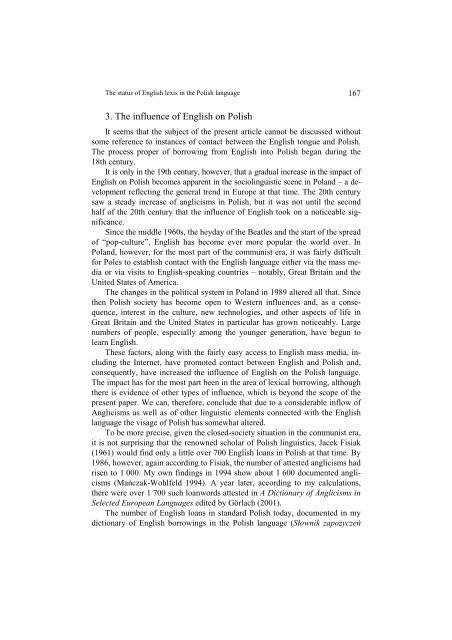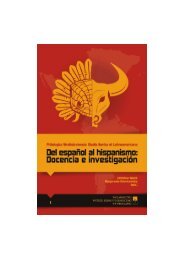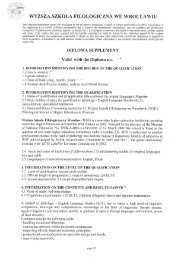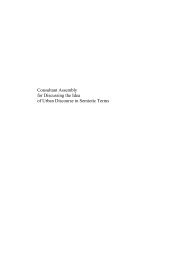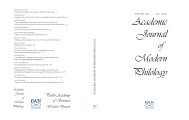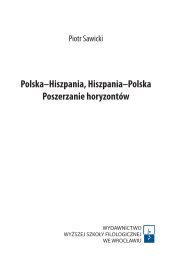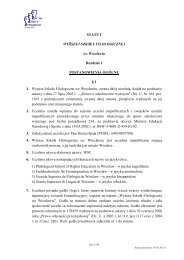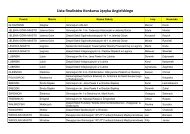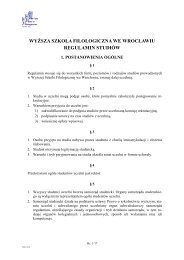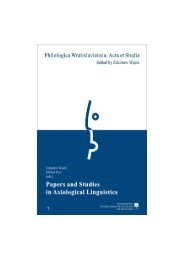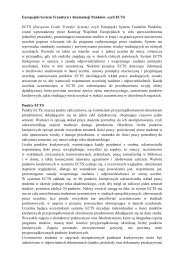s - Wyższa SzkoÅa Filologiczna we WrocÅawiu
s - Wyższa SzkoÅa Filologiczna we WrocÅawiu
s - Wyższa SzkoÅa Filologiczna we WrocÅawiu
Create successful ePaper yourself
Turn your PDF publications into a flip-book with our unique Google optimized e-Paper software.
The status of English lexis in the Polish language 167<br />
3. The influence of English on Polish<br />
It seems that the subject of the present article cannot be discussed without<br />
some reference to instances of contact bet<strong>we</strong>en the English tongue and Polish.<br />
The process proper of borrowing from English into Polish began during the<br />
18th century.<br />
It is only in the 19th century, ho<strong>we</strong>ver, that a gradual increase in the impact of<br />
English on Polish becomes apparent in the sociolinguistic scene in Poland – a development<br />
reflecting the general trend in Europe at that time. The 20th century<br />
saw a steady increase of anglicisms in Polish, but it was not until the second<br />
half of the 20th century that the influence of English took on a noticeable significance.<br />
Since the middle 1960s, the heyday of the Beatles and the start of the spread<br />
of “pop-culture”, English has become ever more popular the world over. In<br />
Poland, ho<strong>we</strong>ver, for the most part of the communist era, it was fairly difficult<br />
for Poles to establish contact with the English language either via the mass media<br />
or via visits to English-speaking countries – notably, Great Britain and the<br />
United States of America.<br />
The changes in the political system in Poland in 1989 altered all that. Since<br />
then Polish society has become open to Western influences and, as a consequence,<br />
interest in the culture, new technologies, and other aspects of life in<br />
Great Britain and the United States in particular has grown noticeably. Large<br />
numbers of people, especially among the younger generation, have begun to<br />
learn English.<br />
These factors, along with the fairly easy access to English mass media, including<br />
the Internet, have promoted contact bet<strong>we</strong>en English and Polish and,<br />
consequently, have increased the influence of English on the Polish language.<br />
The impact has for the most part been in the area of lexical borrowing, although<br />
there is evidence of other types of influence, which is beyond the scope of the<br />
present paper. We can, therefore, conclude that due to a considerable inflow of<br />
Anglicisms as <strong>we</strong>ll as of other linguistic elements connected with the English<br />
language the visage of Polish has somewhat altered.<br />
To be more precise, given the closed-society situation in the communist era,<br />
it is not surprising that the renowned scholar of Polish linguistics, Jacek Fisiak<br />
(1961) would find only a little over 700 English loans in Polish at that time. By<br />
1986, ho<strong>we</strong>ver, again according to Fisiak, the number of attested anglicisms had<br />
risen to 1 000. My own findings in 1994 show about 1 600 documented anglicisms<br />
(Mańczak-Wohlfeld 1994). A year later, according to my calculations,<br />
there <strong>we</strong>re over 1 700 such loanwords attested in A Dictionary of Anglicisms in<br />
Selected European Languages edited by Görlach (2001).<br />
The number of English loans in standard Polish today, documented in my<br />
dictionary of English borrowings in the Polish language (Słownik zapożyczeń


